cheltenham
New Member
"Scratch the Russian and you will find the Tartar"
After the publication of Putin's photos at a pro-Kremlin youth forum in a summer camp on Lake Seliger in the Russian Tver Region , 350 km north of Moscow, discussions about a strange unrecognizable face of the Russian leader erupted on Russian Internet blogs.
Many Russians state that Putin now has a Mongolian-type eye shape and cheek.
"Putin is a Mongol!", says a young Democratic opposition leader Roman Dobrokhotov who is also known in the West. Seeing a close-up photo of Putin with two narrow slits as eyelids, Mr. Dobrokhotov writes: "Botox is evil. A little more and he would have to hide his face behind a handkerchief, like Michael Jackson did".
Source: Kavkaz Center
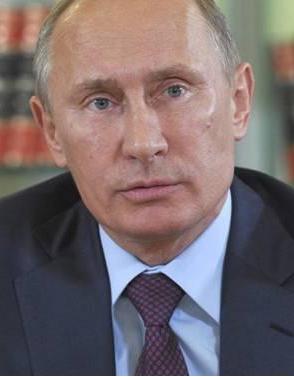
After the Mongol invasion of Russia, the Rurikid rulers of Russian principalities were eager to obtain political advantages for themselves and their countries by marrying into the House of Genghis. Alexander Nevsky was adopted by Batu Khan as his son. Alexander's grandson Yury of Moscow married a sister of Uzbeg Khan; however, they had no progeny. On the other hand, petty Mongol princelings of Genghisid stock sometimes settled in Russia. For instance, Berke's nephew adopted the Christian name Peter and founded St. Peter's Monastery in Rostov, where his descendants were long prominent as boyars.
The issue of three Russian-Mongol marriages may be traced down to the present. The most famous was the marriage of St. Fyodor the Black, later proclaimed a patron saint of Yaroslavl, to a daughter of the Mongol khan Mengu-Timur.[3] Fyodor's relations with the khan were idyllic: he spent more time in the Horde (where he was given extensive possessions) than in his capital. Male-line descendants of Fyodor's marriage to the Tatar princess include all the later rulers of Yaroslavl and two dozens princely families (such as the Shakhovskoy, Lvov, or Prozorovsky, among others), which passed Genghis genes to other aristocratic families of Russia.
Prince Gleb of Beloozero, a grandson of Konstantin of Russia, was another Rurikid prince influential at the Mongol court. Gleb married the only daughter of Khan Sartaq. From this marriage descends the House of Belozersk, whose scions include Princes Ukhtomsky and Beloselsky-Belozersky.
The most problematic is the marriage of Narimont, the second son of Gediminas of Lithuania, to Toqta's daughter. The earliest source for this marriage is the "Jagiellonian genealogy", compiled in the 18th-century from Ruthenian chronicles by one Joannes Werner. While the marriage is not utterly impossible (Narimont spent several years in the Horde), there are no extant chronicles which mention Narimont's wife. This highly uncertain gateway derives particular interest from the fact that the Galitzine, Khovansky and Kurakin princely families are Narimont's agnatic descendants.
Ivan the Terrible,his mother Elena Glinskaya is a descendant of Mongol Mamai Khan

Sain-Burat (Simeon Bekbulatovich),Tsar of Russia,direct descendant of Genghis Khan

Boris Godunov,Tsar of Russia,Mongol-tatar origin

Peter the Great

Mikhail Kutuzov,the Russian general who defeated Napoleon.Mongol-Tatar origin

Russian alcoholism and the "Mongoloid gene"
Russian alcoholism and the "Mongoloid gene"
SCIENTISTS researching cures for alcoholism and hangovers say that they have found a genetic link between Russians’ traditional weakness for drink and the marauding Mongol armies.
As many as 50 per cent of Muscovites are estimated to have inherited Mongol genes that make them absorb more alcohol into the bloodstream and break it down at a slower rate than most Europeans, they say.
That means that they get more drunk and have worse hangovers, and are more likely to become addicted to alcohol, given Russia’s taste for vodka, its harsh climate and the social and economic chaos after the collapse of the Soviet Union.
“The difference is huge — in reaction speed, memory, hand tremor — and in how they recover,” Vladimir Nuzhny, of the Health Ministry’s National Narcology Research Centre, said. “On average, 50 per cent of people in Moscow have this Mongoloid gene. So this, we think, is part of the problem.”
As part of the study, the scientists paid 12 volunteer students to drink 350 grams, about a third of a bottle, of vodka in an hour, and then monitored their behaviour.
“That’s a lot by Western standards, but it’s normal for Russia,” Dr Nuzhny told The Times. “At first they thought it was great, because they were being paid to drink, but after a while they realised it was more like work.”
The intoxicated students had to perform a series of tests, including answering questionnaires and playing rally-driving computer games, and they were breathalysed at regular intervals. The scientists even measured their ability to stand up straight.
After sleeping off the effects in a dormitory at the laboratory — which had a karaoke machine — the students were given a slap-up breakfast before doing more tests to measure their hangovers. The study showed that those with the Mongol genes absorbed 50 per cent more alcohol into the bloodstream at peak levels and metabolised it much more slowly than the other students.
“The way they get drunk is completely different. They are also more likely to feel aggressive or depressed,” Dr Nuzhny said. “They do not necessarily look Mongolian, but the gene that governs how they metabolise alcohol is Mongoloid.”
The Mongols swept across Asia and Russia and into Europe in the 13th century and ruled Russia for two centuries. Inter-marriage with the Slavs and other ethnic groups was common.
Scientists have long known that people of Mongol extraction, including Chinese, Koreans and Japanese, have an enzyme for metabolising alcohol that is different from that of Caucasian Europeans.
Dr Nuzhny claims that his study is the first to look at the effect of alcohol on Russians who have inherited Mongol genes. He says that the phenomenon can be explained partly by evolution. The nomadic Mongols, whose only indigenous form of alcohol was fermented mare’s milk, evolved with a different enzyme from the settled Europeans, with their long tradition of producing stronger grape and grain-based alcohol.
Dr Nuzhny’s research is partly funded by pharmaceutical companies trying to develop drugs to cure hangovers and alcoholism.
Russians drink about 15 litres of pure alcohol a head each year, one of the highest rates in the world, and by some estimates one in seven Russians are alcoholics. Alcohol is largely to blame for a fall in life expectancy to less than 59 since the fall of the Soviet Union.
Lenin is 1/4 Kalmyk Mongol
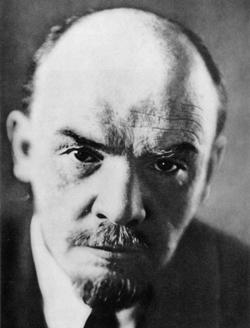
Semen Budyonnuyy,the greatest Russian military commander
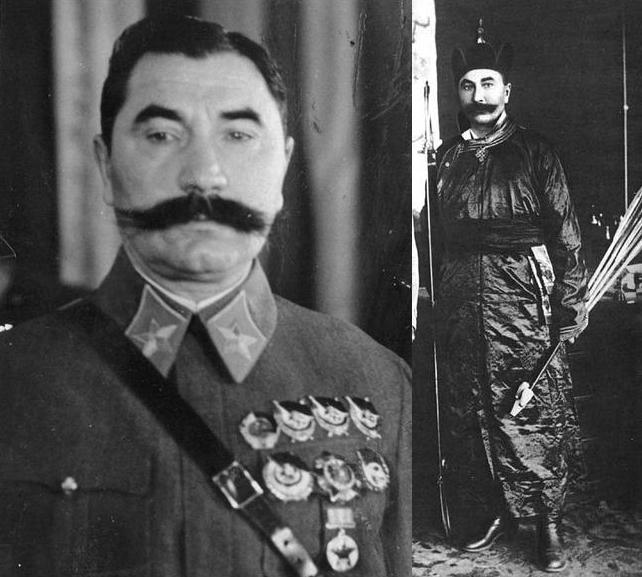
Basan Gorodvikhov,the man who led army to Berlin in 1944
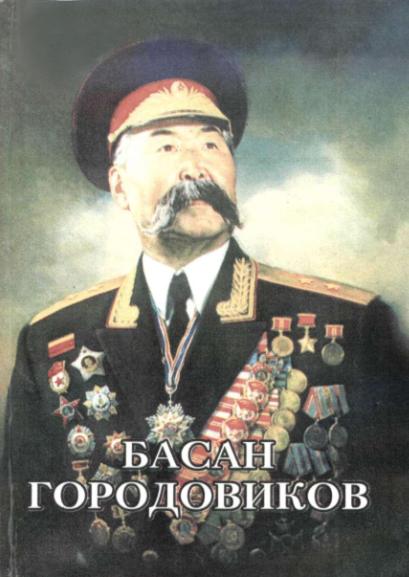
Stalin Khan lol
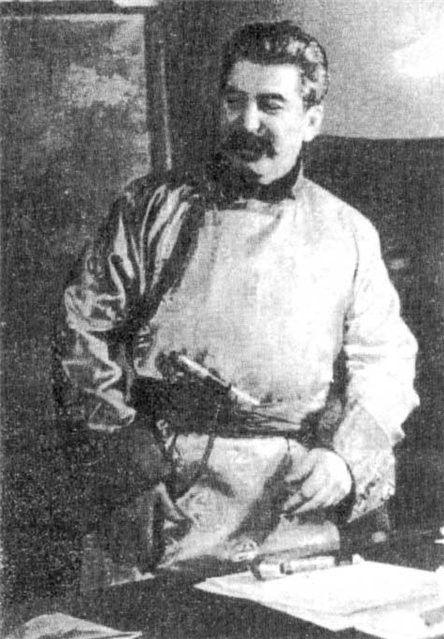
Semyon Timoshenko
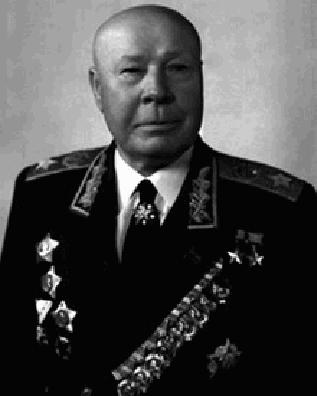 Leonid Brezhnev,the General Secretary of the Central Committee of the Communist Party of the Soviet Union from 1964 until 1982
Leonid Brezhnev,the General Secretary of the Central Committee of the Communist Party of the Soviet Union from 1964 until 1982
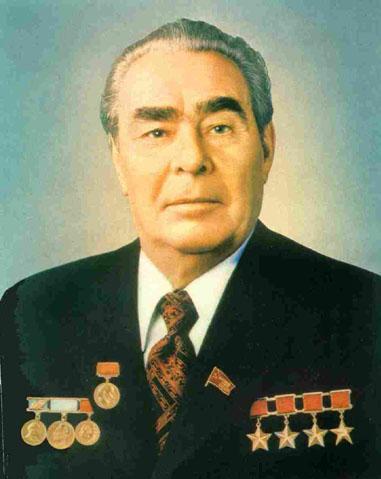
After the publication of Putin's photos at a pro-Kremlin youth forum in a summer camp on Lake Seliger in the Russian Tver Region , 350 km north of Moscow, discussions about a strange unrecognizable face of the Russian leader erupted on Russian Internet blogs.
Many Russians state that Putin now has a Mongolian-type eye shape and cheek.
"Putin is a Mongol!", says a young Democratic opposition leader Roman Dobrokhotov who is also known in the West. Seeing a close-up photo of Putin with two narrow slits as eyelids, Mr. Dobrokhotov writes: "Botox is evil. A little more and he would have to hide his face behind a handkerchief, like Michael Jackson did".
Source: Kavkaz Center

After the Mongol invasion of Russia, the Rurikid rulers of Russian principalities were eager to obtain political advantages for themselves and their countries by marrying into the House of Genghis. Alexander Nevsky was adopted by Batu Khan as his son. Alexander's grandson Yury of Moscow married a sister of Uzbeg Khan; however, they had no progeny. On the other hand, petty Mongol princelings of Genghisid stock sometimes settled in Russia. For instance, Berke's nephew adopted the Christian name Peter and founded St. Peter's Monastery in Rostov, where his descendants were long prominent as boyars.
The issue of three Russian-Mongol marriages may be traced down to the present. The most famous was the marriage of St. Fyodor the Black, later proclaimed a patron saint of Yaroslavl, to a daughter of the Mongol khan Mengu-Timur.[3] Fyodor's relations with the khan were idyllic: he spent more time in the Horde (where he was given extensive possessions) than in his capital. Male-line descendants of Fyodor's marriage to the Tatar princess include all the later rulers of Yaroslavl and two dozens princely families (such as the Shakhovskoy, Lvov, or Prozorovsky, among others), which passed Genghis genes to other aristocratic families of Russia.
Prince Gleb of Beloozero, a grandson of Konstantin of Russia, was another Rurikid prince influential at the Mongol court. Gleb married the only daughter of Khan Sartaq. From this marriage descends the House of Belozersk, whose scions include Princes Ukhtomsky and Beloselsky-Belozersky.
The most problematic is the marriage of Narimont, the second son of Gediminas of Lithuania, to Toqta's daughter. The earliest source for this marriage is the "Jagiellonian genealogy", compiled in the 18th-century from Ruthenian chronicles by one Joannes Werner. While the marriage is not utterly impossible (Narimont spent several years in the Horde), there are no extant chronicles which mention Narimont's wife. This highly uncertain gateway derives particular interest from the fact that the Galitzine, Khovansky and Kurakin princely families are Narimont's agnatic descendants.
Ivan the Terrible,his mother Elena Glinskaya is a descendant of Mongol Mamai Khan
Sain-Burat (Simeon Bekbulatovich),Tsar of Russia,direct descendant of Genghis Khan

Boris Godunov,Tsar of Russia,Mongol-tatar origin

Peter the Great

Mikhail Kutuzov,the Russian general who defeated Napoleon.Mongol-Tatar origin

Russian alcoholism and the "Mongoloid gene"
Russian alcoholism and the "Mongoloid gene"
SCIENTISTS researching cures for alcoholism and hangovers say that they have found a genetic link between Russians’ traditional weakness for drink and the marauding Mongol armies.
As many as 50 per cent of Muscovites are estimated to have inherited Mongol genes that make them absorb more alcohol into the bloodstream and break it down at a slower rate than most Europeans, they say.
That means that they get more drunk and have worse hangovers, and are more likely to become addicted to alcohol, given Russia’s taste for vodka, its harsh climate and the social and economic chaos after the collapse of the Soviet Union.
“The difference is huge — in reaction speed, memory, hand tremor — and in how they recover,” Vladimir Nuzhny, of the Health Ministry’s National Narcology Research Centre, said. “On average, 50 per cent of people in Moscow have this Mongoloid gene. So this, we think, is part of the problem.”
As part of the study, the scientists paid 12 volunteer students to drink 350 grams, about a third of a bottle, of vodka in an hour, and then monitored their behaviour.
“That’s a lot by Western standards, but it’s normal for Russia,” Dr Nuzhny told The Times. “At first they thought it was great, because they were being paid to drink, but after a while they realised it was more like work.”
The intoxicated students had to perform a series of tests, including answering questionnaires and playing rally-driving computer games, and they were breathalysed at regular intervals. The scientists even measured their ability to stand up straight.
After sleeping off the effects in a dormitory at the laboratory — which had a karaoke machine — the students were given a slap-up breakfast before doing more tests to measure their hangovers. The study showed that those with the Mongol genes absorbed 50 per cent more alcohol into the bloodstream at peak levels and metabolised it much more slowly than the other students.
“The way they get drunk is completely different. They are also more likely to feel aggressive or depressed,” Dr Nuzhny said. “They do not necessarily look Mongolian, but the gene that governs how they metabolise alcohol is Mongoloid.”
The Mongols swept across Asia and Russia and into Europe in the 13th century and ruled Russia for two centuries. Inter-marriage with the Slavs and other ethnic groups was common.
Scientists have long known that people of Mongol extraction, including Chinese, Koreans and Japanese, have an enzyme for metabolising alcohol that is different from that of Caucasian Europeans.
Dr Nuzhny claims that his study is the first to look at the effect of alcohol on Russians who have inherited Mongol genes. He says that the phenomenon can be explained partly by evolution. The nomadic Mongols, whose only indigenous form of alcohol was fermented mare’s milk, evolved with a different enzyme from the settled Europeans, with their long tradition of producing stronger grape and grain-based alcohol.
Dr Nuzhny’s research is partly funded by pharmaceutical companies trying to develop drugs to cure hangovers and alcoholism.
Russians drink about 15 litres of pure alcohol a head each year, one of the highest rates in the world, and by some estimates one in seven Russians are alcoholics. Alcohol is largely to blame for a fall in life expectancy to less than 59 since the fall of the Soviet Union.
Lenin is 1/4 Kalmyk Mongol

Semen Budyonnuyy,the greatest Russian military commander

Basan Gorodvikhov,the man who led army to Berlin in 1944

Stalin Khan lol

Semyon Timoshenko


